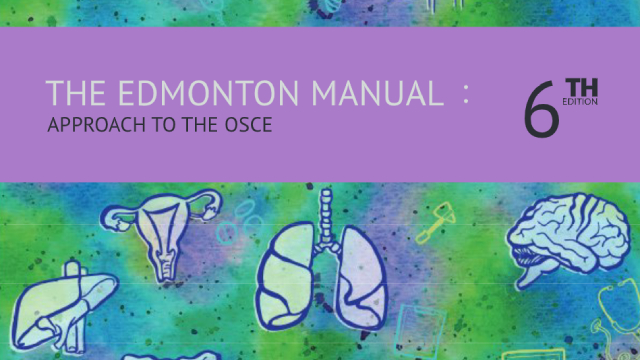
For thousands of medical students across Canada, the Edmonton Manual-one of the country's best study guides for the Objective Structured Clinical Examinations, which every student must pass to become a doctor-is a lifesaver. Now, the team behind the guide is hoping to give even more to their fellow students through a new endowment.
The newly created Edmonton Manual Award in Medicine is a thank you to the students who contributed to making the study guide a success, says co-editor-in-chief and fourth-year medical
student Cailey Turner.
"Many people have volunteered countless hours through the years to make it what it is today," she says. "From cover design to content creation, we are proud that the Edmonton Manual is created and run entirely by medical students, residents and faculty here at the University of Alberta."
Senior editor and third-year MD/MBA student Trent Schimmel agrees.
With more than 7,500 copies sold across Canada and plans to expand, Schimmel says this was the right time to expand into philanthropy. "This award is another way we hope to leverage this growing success to give back and support medical learners where it all began," he says.
"We thought the opportunity to create an award that will be felt on a more personal level in our community-and will exist in perpetuity-was a good way to fulfil our social missions as an organization," he says. "Giving back to our peers financially is a concrete way to show our appreciation of their support and try to reduce the financial burden they might be feeling."
The award will make $2,000 available annually to third- and fourth-year medical students, a group where there is typically a gap in available award funding, says Schimmel. "It's an ideal fit for us, because what we offer in the Edmonton Manual is most useful to learners at this stage in their training."
Applications for the award are expected to open later this year, with the first round of funding disbursed early in 2021. As the success of the manual continues, the team hopes to expand the endowment in the future.
"We plan to increase the principle of the endowment yearly to increase the funds available for students, so they can have a little less financial stress and can concentrate on acing their exams and caring for patients," Schimmel says.
The newly created Edmonton Manual Award in Medicine is a thank you to the students who contributed to making the study guide a success, says co-editor-in-chief and fourth-year medical
student Cailey Turner.
"Many people have volunteered countless hours through the years to make it what it is today," she says. "From cover design to content creation, we are proud that the Edmonton Manual is created and run entirely by medical students, residents and faculty here at the University of Alberta."
Senior editor and third-year MD/MBA student Trent Schimmel agrees.
With more than 7,500 copies sold across Canada and plans to expand, Schimmel says this was the right time to expand into philanthropy. "This award is another way we hope to leverage this growing success to give back and support medical learners where it all began," he says.
"We thought the opportunity to create an award that will be felt on a more personal level in our community-and will exist in perpetuity-was a good way to fulfil our social missions as an organization," he says. "Giving back to our peers financially is a concrete way to show our appreciation of their support and try to reduce the financial burden they might be feeling."
The Edmonton Manual Team
Editors-in-chief
Nazlin Karmali, BSc and Cailey Turner, BSc
Senior editors
Scott Wong, MSc and Trent Schimmel, BSc
Senior director of marketing & sales
Trent Schimmel, BSc
Junior editors
Richard He, BSc, and Karolin Klement, MSc, PhD
Applications for the award are expected to open later this year, with the first round of funding disbursed early in 2021. As the success of the manual continues, the team hopes to expand the endowment in the future.
"We plan to increase the principle of the endowment yearly to increase the funds available for students, so they can have a little less financial stress and can concentrate on acing their exams and caring for patients," Schimmel says.